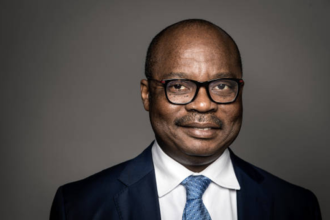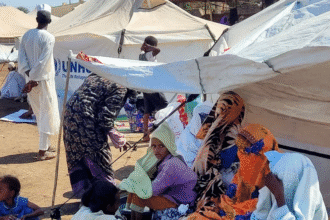For 38-year-old Asylum seeker from the Democratic Republic of Congo (DRC), Dr. Yves Kaduli, the U.S. presidential contest has life-altering implications.
- Why Are More African Migrants Choosing the U.S.?
- What Are the Challenges for African Asylum Seekers in the U.S.?
- What Risks Do Migrants Face If They Are Deported?
- Why Do Some Migrant Groups Seem to Receive Preferential Treatment?
- How Will the U.S. Election Shape Immigration Policy?
- How Long Will Asylum Seekers Like Dr. Kaduli Have to Wait?
Dr. Kaduli said, “We deserve safety.” Since 2014, he has been dreaming of a life free from persecution in the United States after escaping the bloodshed of his native country.
Working as a doctor at Cifunzi Hospital in Kalonge, Dr. Kaduli started his path to America.
He and his associates included Nobel Peace Prize recipient Dr. Denis Mukwege on the front lines of the nation’s strife. “Women underwent rape.
I saw it. Now in its third decade, he says, “I felt it in my body,” detailing the terrible effects of DRC’s continuing conflict.
Dr. Kaduli joined his colleagues in opposing the activities of armed groups and the neglect of then-President Joseph Kabila’s government in safeguarding the populace as civilian casualties grew.
These initiatives did, however, Cost something. Dr. Kaduli remembers how “unknown men” singled out him and another colleague one night at the hospital.
He says, “They came, they took me and another colleague by force during our night shift,” adding that they were imprisoned in a makeshift camp far into the bush. Before he attempted a daring escape, they suffered torture, beatings, and death threats.
Dr. Kaduli set out on a five-year trip after bidding farewell to his mother and small son. He crossed borders and continents from nearby Rwanda via Cuba, Ecuador, and Nicaragua before arriving at the U.S.-Mexico border in 2019. Thinking back on his stay there, he remembers, “I stayed on the border for at least a month.
We were living in filthy tiny tents. He spent 15 months in detention while in the United States, finally being released to wait for a ruling on his asylum application. He is a medical technician living in Virginia right now.
The Life and Legacy of Sultani Makenga: The Man Behind the M23 Rebellion
Why Are More African Migrants Choosing the U.S.?
Dr. Kaduli is not isolated. Thousands of African immigrants travel the dangerous path over borders and seas every year to get to the U.S.-Mexico border. Recent estimates show a significant rise in African migration to the United States; U.S. Customs and Border Protection notes 13,000 African migrants at the southern border in 2022. That figure had doubled to 58,000 by 2023.
Asylum applications from West African nations, including Senegal, Mauritania, and Guinea, have surged dramatically. Applications from Senegalese citizens alone surged from 773 in 2022 to a shockingly 13,224 in 2024.
The state of the U.S. economy is one element motivating young Senegalese immigrants to come. According to the World Bank, more than a third of Senegal’s population lives in poverty, notwithstanding the country’s relative stability. These immigrants, fearing the risks of the Mediterranean approach to Europe, select what they believe to be a safer way, depending on visa-friendly Nicaragua, to simplify the travel.
What Are the Challenges for African Asylum Seekers in the U.S.?
According to experts, African migration to the United States has different underlying reasons. One analyst argues, “People are coming to the U.S. for mixed reasons.” “There are incentives to apply for Asylum since they can get a work permit while they wait; they can be fleeing persecution and economic difficulty.” For many, especially those wanting to help family members back home, the option to work lawfully while awaiting a decision is a lifeline.
The road to refuge is tricky for African immigrants who encounter language challenges, a lack of community support, and limited knowledge in the United States about African wars. “Judges and lawyers are sometimes not familiar with the circumstances in some of the African countries that people are fleeing,” the expert notes. These elements heighten the already complex nature of the asylum process.
What Risks Do Migrants Face If They Are Deported?
Apart from the challenges inside the U.S. asylum system, deported immigrants sometimes run great danger when returning. Human Rights Watch’s 2022 report said that returning Cameroonian asylum seekers from the United States experienced detention, abuse, even rape. Researchers raise significant worries, saying that people “were deported directly back to harm and persecution and in contexts where there are ongoing conflicts and widespread human rights violations.”
Federal policy manager Nils Kinuani of African Communities Together attests to the great anxiety these stories cause in his neighborhood. People get afraid. He expresses worries about possible attacks on refugee programs. Along with others, his group is pushing for more legal paths, including humanitarian parole status, which would let African immigrants—particularly those from conflict-torn nations—live and work temporarily in the United States.
Why Do Some Migrant Groups Seem to Receive Preferential Treatment?
The apparent differences in treatment among various groups generate one primary source of conflict. Mr. Kinuani notes how humanitarian parole for Ukrainian immigrants started soon after the conflict. “Ukrainian groups had no need whatsoever for humanitarian parole or advocacy. We have to push, he adds, for a nation like Sudan. Nine million people have been displaced from their homes by Sudan’s April 2023 conflict. Still, the United States does not have an official humanitarian parole program for Sudanese immigrants or any other African country.
How Will the U.S. Election Shape Immigration Policy?
The outcome of the 2024 U.S. presidential contest could significantly influence African immigrants like Dr. Kaduli. Though their strategies differ, both parties promise to handle immigration and the U.S.-Mexico border issue. Former President Donald Trump, the Republican contender, has promised “the largest deportation operation in American history,” while Vice President Kamala Harris, the Democratic opponent, is suggesting the resurrecting of a bipartisan border security measure meant to speed up and fair application of the asylum process. Although Harris’s plan calls for more asylum agents, the UN and human rights activists object.
Immigration rules have already tightened under President Joe Biden’s direction. Bypassing standard asylum processing, a June presidential order lets migrants who enter the U.S. illegally be removed quickly once the border reaches a specific point. Although critics contend this regulation further reduces options for those escaping persecution, U.S. officials record a decline in border crossings since this policy took effect.
Polling shows that American immigration opinions are changing; for the first time in almost two decades, most now support lowering immigration rates. Experts say the malfunction of the U.S. immigration system causes this irritation. One analyst notes that people are claiming asylum since there isn’t any way to enter the United States, and the asylum system is taxed in the United States.
How Long Will Asylum Seekers Like Dr. Kaduli Have to Wait?
Dr. Kaduli finds himself in flux, waiting four to 10 years until his asylum claim is decided. His status now forbids him from leaving the United States—even to see relatives. Sadly, his father died during this period, but he was unable to get back to be with his family. He says, “I feel uncomfortable when my case is still pending and see on television the speech of politicians; but, I know if I am here it’s for a reason.”
Dr. Kaduli clings to a vision of when his son and mother will join him in the United States, where he can support his family and contribute to his new residence. He says, “I believe that America will give me the same values, to work for myself, to help my family, to participate in the economy of this country,” Found “between doubt and hope,” he stays firm, knowing that his path would finally lead to a site of serenity and opportunity.








